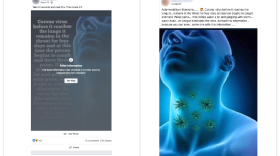
Shannon Bond
Shannon Bond is a business correspondent at NPR, covering technology and how Silicon Valley's biggest companies are transforming how we live, work and communicate.
Bond joined NPR in September 2019. She previously spent 11 years as a reporter and editor at the Financial Times in New York and San Francisco. At the FT, she covered subjects ranging from the media, beverage and tobacco industries to the Occupy Wall Street protests, student debt, New York City politics and emerging markets. She also co-hosted the FT's award-winning podcast, Alphachat, about business and economics.
Bond has a master's degree in journalism from Northwestern University's Medill School and a bachelor's degree in psychology and religion from Columbia University. She grew up in Washington, D.C., but is enjoying life as a transplant to the West Coast.
-
A new report highlights how easy it is to spread hoaxes on Facebook, despite the tech giant's increasing efforts to stop misinformation about the coronavirus and the election.
-
The social network announced new measures to prevent misinformation, threats and confusion surrounding the election, but said it would let Donald Trump Jr's call for an 'army of poll watchers' stand.
-
Oracle accuses Google of illegally copying its software. Google contends the kind of code it used cannot be owned by anyone.
-
House Democrats recommend Congress look at ways to force the companies to split off some of their businesses, saying the tech giants have exploited their power to benefit themselves and hurt rivals.
-
If results of the presidential election are delayed, false claims and other misinformation could thrive online, which is forcing Facebook and Twitter to prepare for worst-case scenarios.
-
With so many people voting by mail, experts warn final results of the 2020 election may be delayed — opening the door for misinformation on social media. What are the platforms doing to prepare?
-
National security officials say Russia is again trying to disrupt the election. But this time, it doesn't have to work so hard because Americans are spreading mistruths and doubts about the election.
-
The tech giant will not allow election-related ads in Search, on YouTube or any of its other properties, citing the likelihood of delayed election results.
-
Facebook critics are banding together to monitor misinformation, hate speech and voter suppression on the social network because, they argue, it has fallen short.
-
The social media companies said the accounts and pages were linked to Russian actors that had launched "hack-and-leak" operations to hurt Hillary Clinton in the 2016 presidential election.








